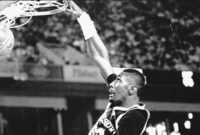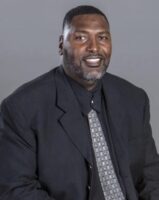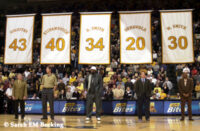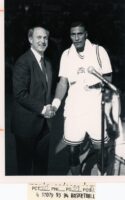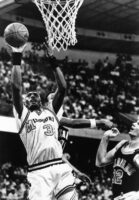Inductees
Doug Smith
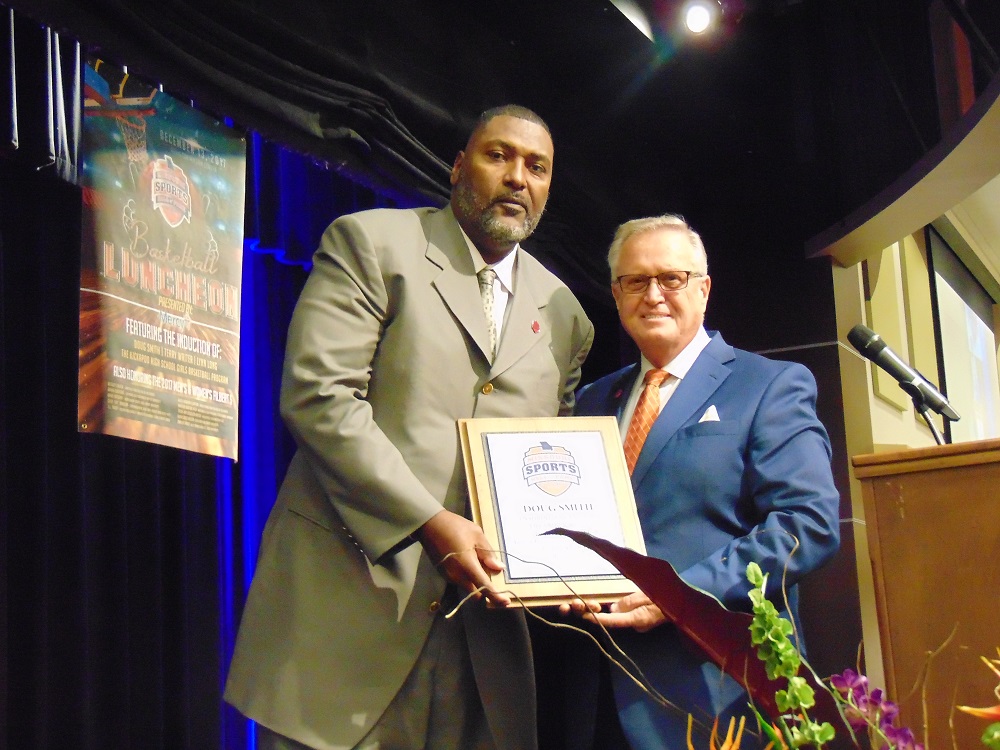
Born: September 17, 1969
He traveled from Detroit determined to carry the University of Missouri deep into the Big Dance, along the way emerged as one of its all-time greats and then received the ultimate compliment in his final home game.
Doug Smith remembers it like yesterday – not so much because the Mizzou Tigers surprised him by retiring his jersey (No. 34) but by the words of veteran coach Norm Stewart, told in front of the Hearnes Center crowd, directed to Smith’s mother, Kathryn.
“He said, ‘I wish there was another Doug,’” Smith recalled.
Imagine if that had come true. After all, Smith used his 6-foot-10 frame to rage his way through college basketball from 1987 to 1991 and became the only 2,000-point, 1,000-rebound player in Mizzou history. Coupled with lifting two teams to NCAA Tournaments, it’s is why the Missouri Sports Hall of Fame is proud to have inducted Smith with the Class of 2017.
Specifically, Smith is second in school history in both points scored (2,184) and rebounds (1,305). In fact, he was just the third player in Big Eight Conference history to pull the dual feat, joining Danny Manning and Wayman Tisdale.
He was the Big Eight Player of the Year in 1990 and 1991, and an All-American and Big Eight Male Athlete of the Year in 1991. He also was a two-time MVP of the Big Eight Tournament in leading Mizzou to the 1989 and 1991 conference tournament championships.
Smith also was a key part of two NCAA Tournament teams in 1989 and 1990, with the 1989 team reaching the Sweet 16.
“Coach Stewart allowed us to be ourselves,” said Smith, the sixth overall selection of the 1991 NBA Draft. “And in the middle of my junior year, that’s when I got on a roll. I started to see the game was coming easily and understood what it took to be a student-athlete. You read the press clippings and the accolades, but it didn’t click until my junior year in college.”
Upon his arrival, fellow Detroit standouts eased in his transition: Lee Coward, Nathan Buntin, Lynn Hardy and John McIntyre. Smith had played with Coward and Buntin on an AAU national championship team. Plus, Derrick Chevious took him under his wing, and Byron Irvin was a positive influence, too.
All of which was why Smith declined offers from Michigan State, North Carolina State and Iowa.
Little did anyone know that Smith, while in high school, had other aspirations.
“I wanted to be a professional bowler,” Smith said. “We were in leagues on Saturdays, and I would tell my coach, ‘I’ve got to get in leagues before practice.’ So then he’d rush over to get me for summer league games.”
“I think,” Smith with a laugh, “I made the right choice.”
College basketball featured great big men back then but especially in the Big Eight. Thus, Smith rolled up his sleeves and went to work to improve. From the end of his eighth-grade year to his senior year in high school, he had grown six inches to 6-10. He had to learn to play big.
“I just tried to take my game from what it was – passing, rebounding and running the floor,” Smith said. “And when I started to look at big men across the country, there were the Stacey Kings and the Danny Mannings. Wayman Tisdale was before me, but I watched film. I took a lot of stuff from different players and crammed it into one.”
Stewart also played a significant role.
“I owe everything to Coach Stewart,” Smith said. “I didn’t have a father in my life so he probably was the most influential person outside of family.”
Smith played five seasons in the NBA, four for the Dallas Mavericks and one for the Boston Celtics, before playing in the Continental Basketball Association and International Basketball League, winning five championships. His final season was 2002.
Looking back, he enjoyed support from many: his late grandmother, Evelyn, who raised him; late mom, Kathryn; uncle Greg and auntie Annette Grays; as well as his wife, Mecheko, and children Lourdes, London, Courtney and LaToya; and in Phoenix, from Jeff and Angela Pugh.
Since retiring, Smith has given back to the game by coaching young players. After all, his jersey hangs from the rafters of Mizzou Arena.
“I owe all that to coaches, teammates and family,” Smith said. “I could have gone in a different direction, especially where I’m from. But sports saves a lot of kids, to be honest. And I just wanted to make my family proud.”
